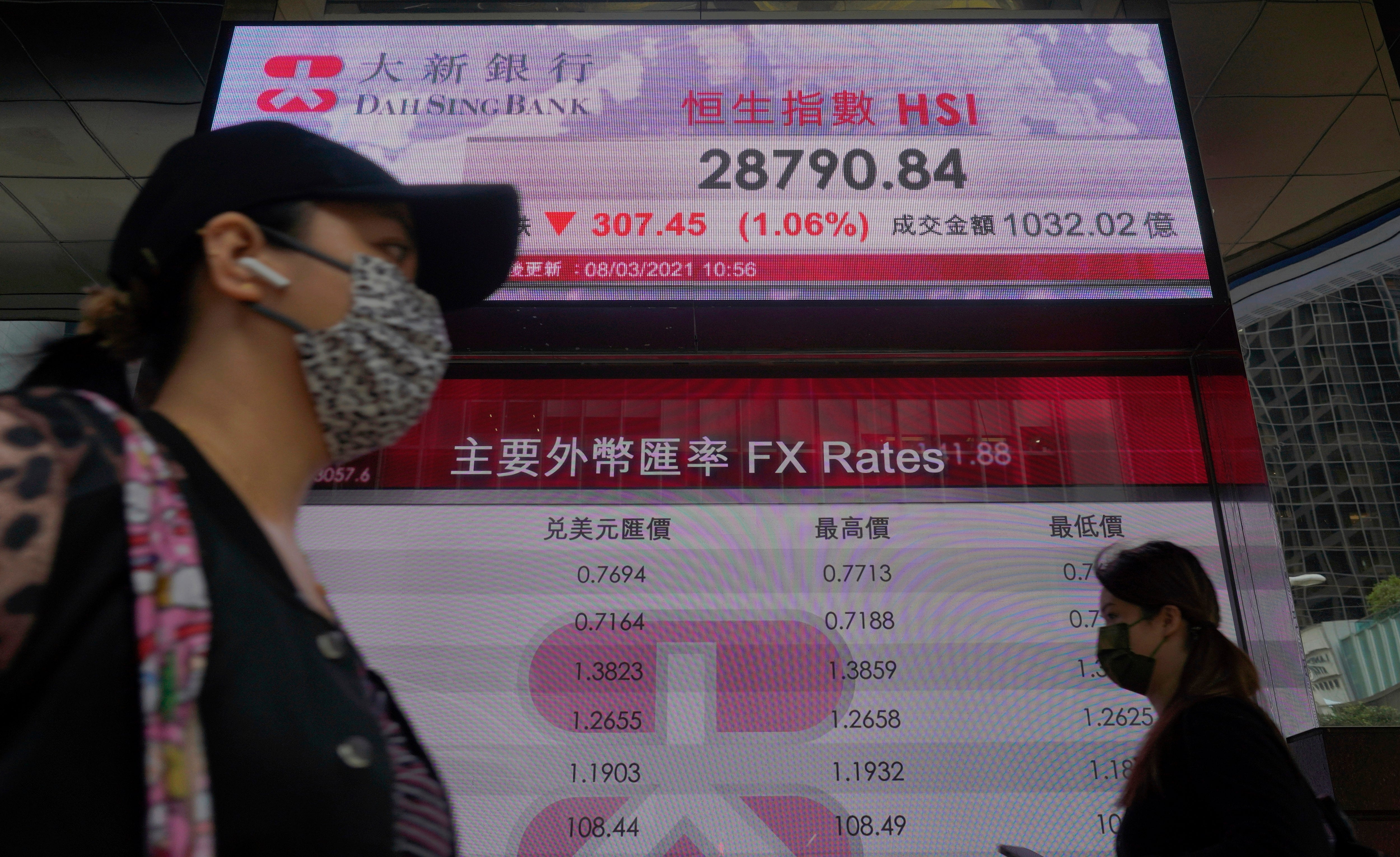Asian shares mixed after US stimulus bill, profit-taking
Asian shares were mixed Monday, as some indexes were lifted by hopes for a gradual global recovery after the U.S. stimulus package passed the Senate over the weekend

Your support helps us to tell the story
From reproductive rights to climate change to Big Tech, The Independent is on the ground when the story is developing. Whether it's investigating the financials of Elon Musk's pro-Trump PAC or producing our latest documentary, 'The A Word', which shines a light on the American women fighting for reproductive rights, we know how important it is to parse out the facts from the messaging.
At such a critical moment in US history, we need reporters on the ground. Your donation allows us to keep sending journalists to speak to both sides of the story.
The Independent is trusted by Americans across the entire political spectrum. And unlike many other quality news outlets, we choose not to lock Americans out of our reporting and analysis with paywalls. We believe quality journalism should be available to everyone, paid for by those who can afford it.
Your support makes all the difference.Asian shares were mixed Monday, as some indexes were lifted by hopes for a gradual global recovery after the U.S. economic relief package passed the Senate over the weekend.
Japan's benchmark Nikkei 225 was up 0.2% in early trading at 28,926.03. Australia's S&P/ASX 200 jumped nearly 1.0% to 6,776.00, while South Korea's Kospi shed 0.2% to 3,020.40. Hong Kong's Hang Seng fell 1.2% to 3,020.40, while the Shanghai Composite fell 0.5% to 3,483.92.
Although shares mostly rose at first, some benchmarks slipped when players sold to lock in profits.
“Asia markets had commenced the week on firmer footing at the start of the week sharing in the optimism over the progress of the U.S. fiscal stimulus package passage,” said Jingyi Pan, market strategist for IG in Singapore.
The bill, passed narrowly by the Senate on Saturday, provides direct payments of up to $1,400 for most Americans and extended emergency unemployment benefits. It's a victory for President Joe Biden and his Democratic allies as the final congressional approval is expected this week.
Chinese trade data also supported an optimistic view that recovery from the damage of the coronavirus pandemic could be expected in coming months.
Beijing data released Saturday showed China’s exports surged 60.6% over a year earlier in the first two months of 2021, as factories reopened and global demand gradually recovered. The huge increase reflects a plunge in manufacturing and exports in early 2020 at the height of China's coronavirus outbreaks.
The gradual vaccine rollout in most parts of the world is also boosting optimism, although it has hardly started in some Asian nations, including Japan.
Japan has extended a state of emergency for the Tokyo area for two more weeks through March 21, asking restaurants and other businesses to close at 8 p.m. as the government tries to keep the economy growing while curtailing the spread of COVID-19 infections.
Wall Street capped a volatile day of trading to finish last week with a broad rally that snapped the market's three-day losing streak. The S&P 500 gained 2% to 3,841.94. The Dow Jones Industrial Average gained 1.9% to 31,496.30. The Nasdaq composite climbed 1.6% to 12,920.15.
Smaller company stocks outgained the broader market, as they have all year. The Russell 2000 index picked up 2.1%, to 2,192.21.
A U.S. government report Friday showed employers added hundreds of thousands more jobs last month than economists expected and was an encouraging sign for the economy. But it also helped lift Treasury yields, adding to worries that rising inflation might end a spell of ultralow interest rates.
Rising oil prices are a part of that picture. After plunging with the onset of the pandemic, as demand plummeted, prices have been recovering in the past few months.
The devastating winter freeze that hit Texas and other parts of the southern United States last month knocked out production of roughly 4 million barrels per day of U.S. oil and prices climbed above $60 a barrel.
Last week, with oil prices rising, some observers were expecting the OPEC cartel and its allies to lift more restrictions and let the oil flow more freely. But OPEC agreed to leave most restrictions in place, despite growing demand.
Benchmark U.S. crude rose $1.42, or 2.2%, to $67.51 a barrel in electronic trading Monday on the New York Mercantile Exchange. It jumped $2.26 to $66.09 per barrel on Friday.
Brent crude, the international standard, gained $1.48 to $70.84 a barrel.
In currency trading, the U.S. dollar inched up to 108.39 Japanese yen from 108.34 yen. The euro cost $1.1902, down from $1.1919.
___
AP Business writer Cathy Bussewitz contributed.